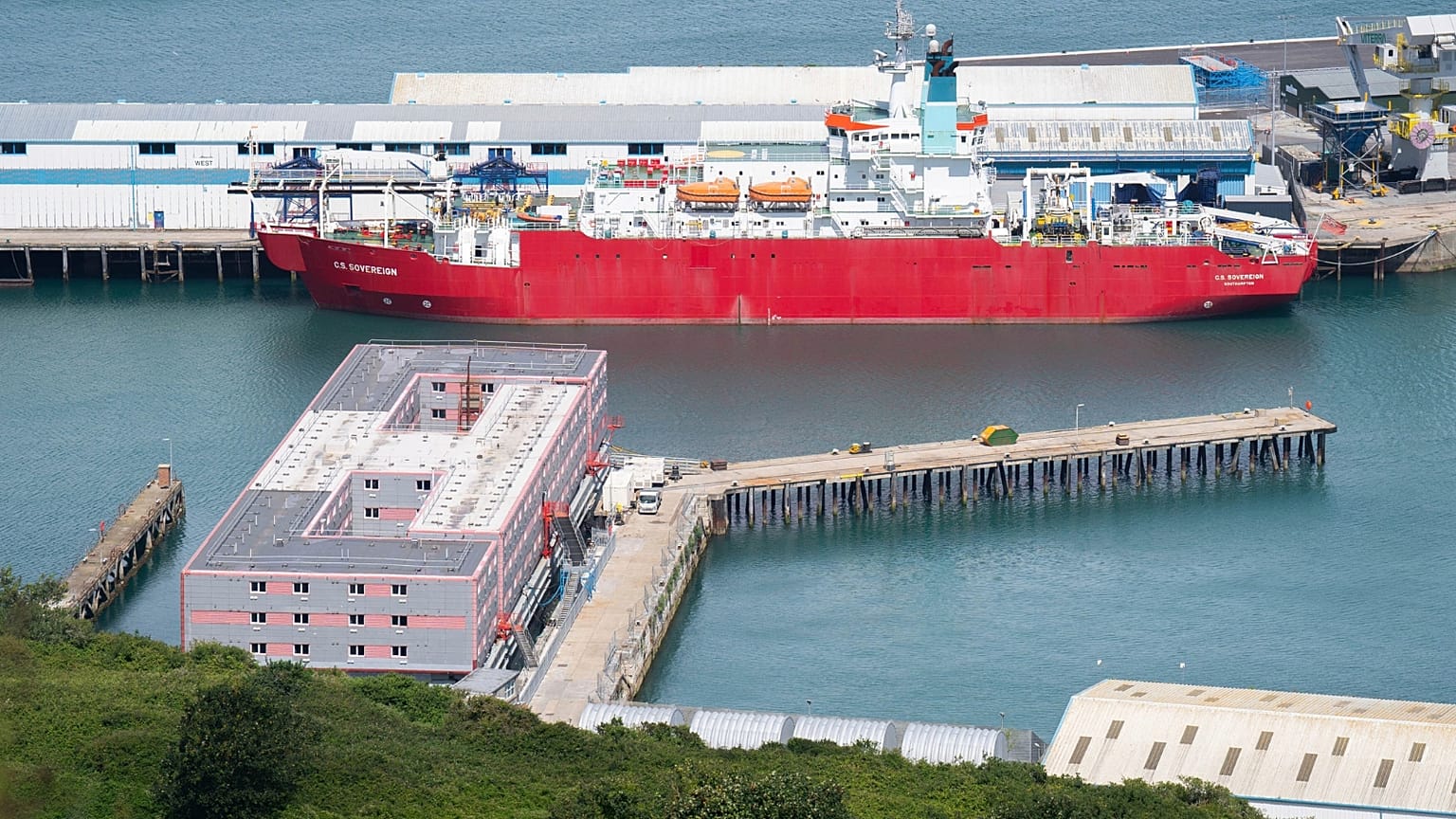The Netherlands, France, Estonia and Scotland have temporarily used cruise ships to accommodate Ukrainians who escaped to safe havens after the Russian invasion.
The UK has started to host several dozen asylum seekers on a barge in the south of England - although plans to put more on board have been scuppered by a Legionella outbreak.
The British government has justified the use of the barge, which has a chequered history around Europe, by saying it is "cheaper and more manageable for communities as our European nightbours are also doing."
So which other countries are using barges or boats to house asylum seekers?
Belgium offers one of the earliest examples. In March 2016, Belgium’s federal agency for the reception of asylum seekers, Fedasil, started to use the Ponton Reno, a converted boat moored in the Muide district.
A total of 250 asylum seekers are accommodated there. While this was originally a private accommodation facility providing services for Fedasil, the agency took over the floating centre itself in 2020.
According to Belgian media, Fedasil is urgently seeking other accommodation spaces for asylum seekers and hopes to house them on canal boats in Belgian ports. As of March of this year, there were 3,000 people seeking refuge in Belgium and staying on the streets, most of whom were in Brussels.
The Netherlands started to use cruise ships temporarily
In April 2022, about 1,500 Ukrainians began staying on a Holland America Line vessel docked in the Dutch port city of Rotterdam. In August 2022, Amsterdam approved a plan to temporarily accommodate at least 1,000 migrants on a cruise ship moored in the Dutch capital’s port as hundreds of asylum seekers were found to be sleeping outside a reception centre.
Prime Minister Mark Rutte said he was ashamed of the situation at the asylum reception centre in the remote north-eastern village of Ter Apel where 700 migrants were sleeping outdoors in unsanitary conditions because there was no space for them inside.
Temporary accommodations for Ukrainians on ferries
The French, Estonian and Scottish governments have also used floating vessels temporarily to accommodate Ukrainians who had to leave their homes after the Russian invasion. In March 2022, for example, a ferry was transformed into a floating hotel to house up to 1,600 Ukrainian refugees in the city of Marseille.
More than 1,000 people lived on a cruise ship named MS Victoria in Edinburgh following the decision of the Scottish government to provide temporary shelter for Ukrainian refugees.
In April 2022, the Estonian government chartered a cruise ship as a temporary home for thousands of refugees from Ukraine.
Ireland plans to request tenders for floating hotels
Ireland is planning to tender for floating hotels and ships to house asylum seekers according to Reuters. Ireland’s Department of Integration said that it expects to publish a request for tenders for floating accommodations for international protection applicants following a detailed investigation and analysis of their use in consultation with various stakeholders.
Asylum applications in the UK: Dramatic increase in 2022
In 2022, there were 89,398 asylum applications submitted to the UK, including dependants, according to British government figures. This is more than twice the number of applications in 2019 and the highest amount in almost two decades.
Last two decades in the UK: Average of 115 asylum applications per day
Nearly one million (962,770) asylum applications, including dependants, were submitted to the UK in the last 22 years. This means that the UK received 115 asylum applications on average per day between 2001 and 2022. In 2022, the average was 245 applications per day.
In 2022, the UK offered protection to 23,841 people including dependants. Additionally, 4,473 partners and children of refugees already living in the UK were granted entry to the UK through family reunion visas.
Nearly two hundred thousand people (191,669) were granted protection by the UK in the last 13 years between 2010 and 2022.
In 2022, the number of first-time asylum applicants in the EU was 881,220 according to the EU’s official statistics office, Eurostat. This latest figure for 2022 marks an increase of 343,865, or 64 per cent, in the number of first-time applicants across the EU compared to 2021. It is also the highest figure since the peaks of 2015 and 2016, when the number of applications exceeded one million in both years, related to the war in Syria.
In 2022, EU Member States also granted temporary protection status to 4.3 million non-EU citizens fleeing Ukraine due to Russia’s invasion.
A first-time applicant for international protection is a person who has lodged an application for asylum for the first time in a given EU country. This excludes repeat applicants and so more accurately reflects the number of newly arrived people applying for international protection.
Main countries of destination: Germany, France, Spain and Austria
In 2022, the main destinations of asylum seekers were Germany, France, Spain and Austria. These four countries received two of every three applications or 66 per cent.
Germany was the most popular country, with 217,735 applicants registered, accounting for 24.7 per cent of all first-time asylum applicants in the EU. It was followed by France (137,510 applicants or 15.6%), Spain (116,135 applicants or 13.2%) and Austria (106,380 applicants or 12.1%).
Main applicants: Syrian, Afghan, Venezuelan and Turkish citizens
In 2022, 131,970 Syrians applied for asylum, accounting for 15 per cent of the total number of first-time applications in the EU. Afghanistan was the second main country of origin of applicants with 113,495 applicants or 13 per cent of the EU total.
Applicants from Venezuela and Turkey each represented about 6 per cent of the EU total, with 50,050 and 49,720 applications, respectively.















